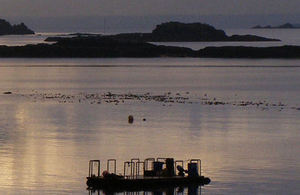Dalgety Bay contamination control progress continues with survey work
MOD has launched essential ecology and wildlife survey work as it progresses plans for managing radium contamination at Dalgety Bay.

Dalgety Bay [Picture: Crown Copyright]
The Defence Infrastructure Organisation (DIO), the Ministry of Defence’s (MOD’s) property and services provider, has commissioned experts to carry out ecology and bird surveys at the Fife beach.
Survey work will be carried out monthly and completed by March 2015. The results will support the Environmental Impact Assessment required by Fife Council.
The ‘Dalgety Bay management strategy’ was published in July 2014. The report recommends a number of measures that will address and manage the contamination at Dalgety Bay.
DIO Chief Operating Officer Colin Wood said:
We are committed to supporting the Dalgety Bay community by following the clear plan as set out in the ‘Dalgety Bay management strategy’.This long term solution sees MOD working in partnership with the Dalgety Bay Implementation Group.
We recognise, there are statutory procedures which must be followed. These include producing an Environmental Impact Assessment, and the ongoing bird and ecology surveys will support this key requirement.
The Dalgety Bay management strategy recommends actions including:
- removal of radioactive (radium) material
- reinforcement, replacement and extension of coastal rock armour
- construction of a replacement slipway at Dalgety Bay Sailing Club
The MOD has agreed in principle to implement these measures, providing it can obtain firm agreement from Fife Council, through further detailed discussions, to meet the costs of maintaining the coastal defences into the longer term. The Scottish Environment Protection Agency (SEPA) has already agreed in principle to continue monitoring the beach once the measures are installed.
Details of the exact timescales and costs for carrying out this work are still being finalised but the MOD expects the work to be complete by the end of 2018.